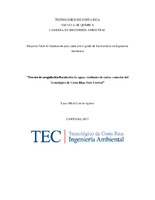Mostrar el registro sencillo del ítem
Proceso de coagulación-floculación de aguas residuales de sodas- comedor del Tecnológico de Costa Rica, Sede Central
| dc.contributor.advisor | ||
| dc.contributor.author | Leitón-Agüero, Laura María | |
| dc.date.accessioned | 2017-09-12T17:11:06Z | |
| dc.date.available | 2017-09-12T17:11:06Z | |
| dc.date.issued | 2017 | |
| dc.identifier.uri | https://hdl.handle.net/2238/7393 | |
| dc.description | Proyecto de Graduación (Licenciatura en Ingeniería Ambiental) Instituto Tecnológico de Costa Rica, Escuela de Química, 2017. | es |
| dc.description.abstract | In wastewaters of three restaurants from the Costa Rican Institute of Technology, Central Campus, high concentrations of detergents have been found, exceeding the guideline of 5 mg/L, established by the Reglamento de Vertido y Reuso de Aguas Residuales Nº 3360. A posible alternative to this problem, is a system based on coagulation-flocculation. The chitosan was selected as the coagulant to be used on the study, because of its biodegrability and easily obtention. Several number of jar tests as coagulation-floculation system, were did to determinate the optimum working conditions of the chitosan with diferent molecular weights and under this conditions, the percentage of detergent removal from the grease trap wastewater from each reastaurant evaluated, was calculated. The chitosan optimal dose for all restaurants evaluated was 30 mg/L at 160 RPM by three minutes. The floculant Hidroxicloruro de Aluminio optimal dose was set by 10 mg/L, four times diluted at 90 RPM by three minutes and then settle for ten minutes. An advantage of using those coagulant and chitosan are the lower doses compared to other coagulants and floculants. (Huang, Li, Li, Yang, & Ran, 2016).The detergents removal efficiency, was increased by up to 40%, compared to the percentage obtained by the grease trap, achieving removal efficiencies up to 99%. In addition, the guideline for detergents, was fullfilled by the three wastewater from restaurants analyzed, after the coagulation-flocculation process. Also, the effluent from the three restaurants was characterized to determine the operating conditions of the proposed coagulation system to remove detergents. It had been found that in order to improve the conditions for the removal of COD and grease and oils, a continous cleaning of the fats and sedimented material, must be carried out by the maintenance staff each fiffteen days, so that the water does not enter into conditions of anaerobiosis. As a parallel result, it was determinated that chitosan, also removes fats and COD. All tests were done with simple sampling of the wastewater from restaurants: Soda TEC, Casa Luna and ASETEC. | es |
| dc.description.sponsorship | tecnológico de Costa Rica, Sede Central | es |
| dc.language.iso | spa | es |
| dc.publisher | Instituto Tecnológico de Costa Rica | es |
| dc.rights | acceso abierto | es |
| dc.subject | Coagulación | es |
| dc.subject | Floculación | es |
| dc.subject | Tratamiento de agua | es |
| dc.subject | Eficiencias de remoción de detergentes | es |
| dc.subject | Aguas residuales | es |
| dc.subject | Quitosano | es |
| dc.title | Proceso de coagulación-floculación de aguas residuales de sodas- comedor del Tecnológico de Costa Rica, Sede Central | es |
| dc.type | proyecto fin de carrera | es |


